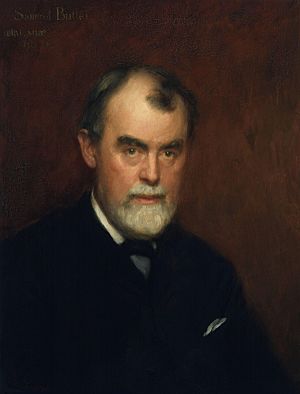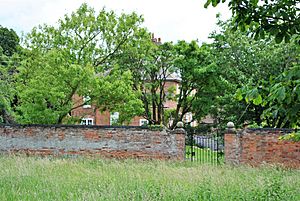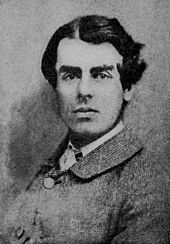Samuel Butler (novelist) facts for kids
Quick facts for kids
Samuel Butler
|
|
|---|---|

Portrait by Charles Gogin
|
|
| Born | 4 December 1835 Langar, Nottinghamshire, England |
| Died | 18 June 1902 (aged 66) London, England |
| Occupation | novelist, writer |
| Education | Shrewsbury School |
| Alma mater | St John's College, Cambridge |
Samuel Butler (born December 4, 1835 – died June 18, 1902) was an English writer and critic. He is famous for his books Erewhon and The Way of All Flesh. Erewhon is a utopian novel, meaning it describes an imaginary perfect world. The Way of All Flesh is a novel that tells a story similar to his own life.
Both of these books are still printed and read today. Butler also studied Christian beliefs, ideas about evolution, and Italian art. He translated famous ancient Greek poems, the Iliad and Odyssey, into English prose. People still use his translations today.
Contents
Early Life and Education
Samuel Butler was born on December 4, 1835, in a village called Langar, Nottinghamshire. His father was Reverend Thomas Butler. His grandfather, Dr. Samuel Butler, was a very smart man who became the headmaster of Shrewsbury School and later a bishop.
Samuel's father, Thomas, wanted to join the Navy. However, his own father pushed him to become a church minister instead. Samuel grew up in a home that he found very difficult. He felt that his father was often against him.
Samuel's education started at home. He later wrote that he always feared and disliked his father. Because of his parents' wishes, Samuel was expected to become a priest too.
At age twelve, he went to Shrewsbury School. He found life there very hard. He later wrote about his headmaster, Benjamin Hall Kennedy, in his novel The Way of All Flesh. In 1854, Samuel went to St John's College, Cambridge. He studied Classics and graduated with top honors in 1858.
Starting His Career
After college, Butler lived in a poor area of London from 1858 to 1859. He was preparing to become a priest. During this time, he noticed that infant baptism did not seem to change people's behavior. This made him question his religious faith.
He wrote to his father about his doubts, but this only made his father angry. So, in September 1859, Samuel decided to move far away. He sailed to New Zealand.
Butler wanted to put a lot of distance between himself and his family. In New Zealand, he became a sheep farmer. He wrote about his experiences there in a book called A First Year in Canterbury Settlement (1863). He made good money selling his farm. More importantly, his time there gave him ideas and material for his famous book, Erewhon.
Ideas on Evolution
Erewhon shows Butler's interest in Charles Darwin's ideas about biological evolution. In 1863, Butler wrote a letter to a New Zealand newspaper called The Press. The letter was titled "Darwin among the Machines" and was signed "Cellarius."
In this letter, Butler compared how humans evolve to how machines evolve. He predicted that machines might one day become more powerful than humans. He wrote that "we shall find ourselves the inferior race" over time. This letter brought up many ideas that people still discuss today about how technology changes quickly.
Butler also criticized Darwin. He felt that Darwin did not give enough credit to his own grandfather, Erasmus Darwin, for his ideas on evolution.
Return to England and Later Works
Butler returned to England in 1864. He lived in London for the rest of his life. In 1872, his novel Erewhon was published without an author's name. People wondered who wrote it. When Butler revealed himself, he became well-known.
He faced financial problems after losing money in some investments. However, his financial situation improved in 1886 when his father passed away. He inherited property that helped him.
Butler loved to travel to Italy every summer. While there, he wrote books about the Italian countryside and art. His books Alps and Sanctuaries of Piedmont and the Canton Ticino (1881) and Ex Voto (1888) show his interest in the Sacri Monti, which are holy mountain sites.
He wrote other books, including a sequel to Erewhon called Erewhon Revisited. His novel The Way of All Flesh was not published until after he died. He thought its critical look at Victorian morality was too strong for his time.
Samuel Butler died on June 18, 1902, at the age of 66. He was cremated, and his ashes were either scattered or buried in an unmarked grave.
Writers like George Bernard Shaw and E. M. Forster admired Butler. He brought a new style to Victorian literature. He also started a tradition of utopian and dystopian literature in New Zealand.
Literary Studies and Criticism
Butler had a theory that the ancient Greek poem Odyssey was written by a young woman from Sicily. He believed that the places described in the poem were based on the coast of Sicily. He wrote about his evidence for this in his book The Authoress of the Odyssey (1897).
He also argued that the gods in Homer's Iliad were like humans but "without the virtue." He thought Homer wanted his readers not to take them too seriously. Butler also translated the Iliad into English prose (1898).
Another of his works, Shakespeare's Sonnets Reconsidered (1899), suggested that if Shakespeare's sonnets were put in a different order, they would tell a story about a homosexual relationship.
The famous novelist Aldous Huxley said that Butler's Erewhon influenced his own novel Brave New World.
Butler's Ideas and Philosophy
Samuel Butler did not belong to any specific literary group. He was a serious, but not professional, student of many topics. These included religious beliefs and ideas about evolution. His strong opinions often put him at odds with both religious and scientific groups of his time.
His most important influence on literature came through The Way of All Flesh. Even though he finished it in the 1880s, it was published in 1903. It was so modern that it was seen as starting a new style of writing. It was especially noted for its early use of psychoanalysis in fiction.
Science fiction writers often consider Butler's "The Book of the Machines" (from Erewhon) a very important work. It introduced the idea that machines could become intelligent and control humans. For example, in Frank Herbert's novel Dune, the "Butlerian Jihad" is named after Samuel Butler. This was a fictional ancient revolt against "thinking machines."
Thinking About Life
Whether in his funny stories, his novels, or his studies, a main idea runs through all of Butler's work. This idea came from his own struggles with his parents. He wanted to understand how things grow, develop, and have a purpose. He tried to connect his own feelings and goals with those of all humanity.
He explored these ideas through philosophy and biology. He saw himself primarily as a "philosophical writer." He looked for biological reasons behind his ideas about life. He believed that the universe had a "soul" and that science could help understand religion.
Ideas About God
In a book published after his death, God the Known and God the Unknown, Samuel Butler wrote about God. He first argued that God was a single, physical being made up of all living things on Earth. This idea is called "panzoism".
Later, he changed his mind and thought that God was made up of all living and non-living things. He also suggested that there might be even "vaster" and more unknown Gods beyond our own.
Ideas About Heredity
Butler believed that each living thing was not completely separate from its parents. Instead, he thought that each being was just an extension of its parents at a later stage of development. He once joked that "Birth has been made too much of."
Ideas About Evolution
Butler accepted the idea of evolution, but he disagreed with Darwin's theory of natural selection. In his book Evolution, Old and New (1879), he accused Darwin of using ideas from other scientists like Buffon, Erasmus Darwin, and Lamarck without giving them enough credit.
Historians describe Butler as someone who supported Lamarckism, another theory of evolution. Butler thought that God might be part of the living process, guiding its natural creativity.
Scientists at the time criticized Butler's writings on evolution. They pointed out that he admitted he was writing for entertainment, not as a scientist. His ideas were not taken seriously by most professional biologists. His books received negative reviews in scientific journals like Nature.
However, some people, like the anthropologist Gregory Bateson, found value in Butler's ideas. Bateson called him "the ablest contemporary critic of Darwinian evolution." He noted Butler's understanding of how habits help living things adapt to their environment.
Music Interests
In his novel Ernest Pontifex or The Way of All Flesh, the main character says he tried to like modern music but found it harder as he got older. When asked when modern music began, he said, "with Sebastian Bach."
Butler only liked the music of Handel. He even composed choral works with his friend Henry Festing Jones that sounded like Handel's music, but with funny lyrics.
Biography and Criticism
Samuel Butler's friend, Henry Festing Jones, wrote a detailed two-volume biography called Samuel Butler, Author of Erewhon (1835–1902): A Memoir. It was published in 1919.
Butler's novel The Way of All Flesh was published after his death in 1903 by his literary executor, R. A. Streatfeild. However, this version changed Butler's original text. The true original manuscript was published in 1964 under Butler's first title, Ernest Pontifex or The Way of All Flesh.
Main Works
- Darwin among the Machines (1863)
- Erewhon, or Over the Range (1872)
- The Fair Haven (1873)
- Life and Habit (1878)
- Evolution, Old and New; Or, the Theories of Buffon, Dr. Erasmus Darwin, and Lamarck, as compared with that of Charles Darwin' (1879)
- Unconscious Memory (1880)
- Alps and Sanctuaries of Piedmont and the Canton Ticino (1881)
- Luck or Cunning as the Main Means of Organic Modification? (1887)
- Ex Voto (1888)
- The Authoress of the Odyssey (1897)
- The Iliad of Homer, Rendered into English Prose (1898)
- Shakespeare's Sonnets Reconsidered (1899)
- The Odyssey of Homer, Rendered into English Prose (1900)
- Erewhon Revisited Twenty Years Later (1901)
- The Way of All Flesh (1903)
- God the Known and God the Unknown (1909)
- The Note-Books of Samuel Butler (1912)
- A First Year in Canterbury Settlement With Other Early Essays (1914)
Images for kids
See also
 In Spanish: Samuel Butler (novelista) para niños
In Spanish: Samuel Butler (novelista) para niños




